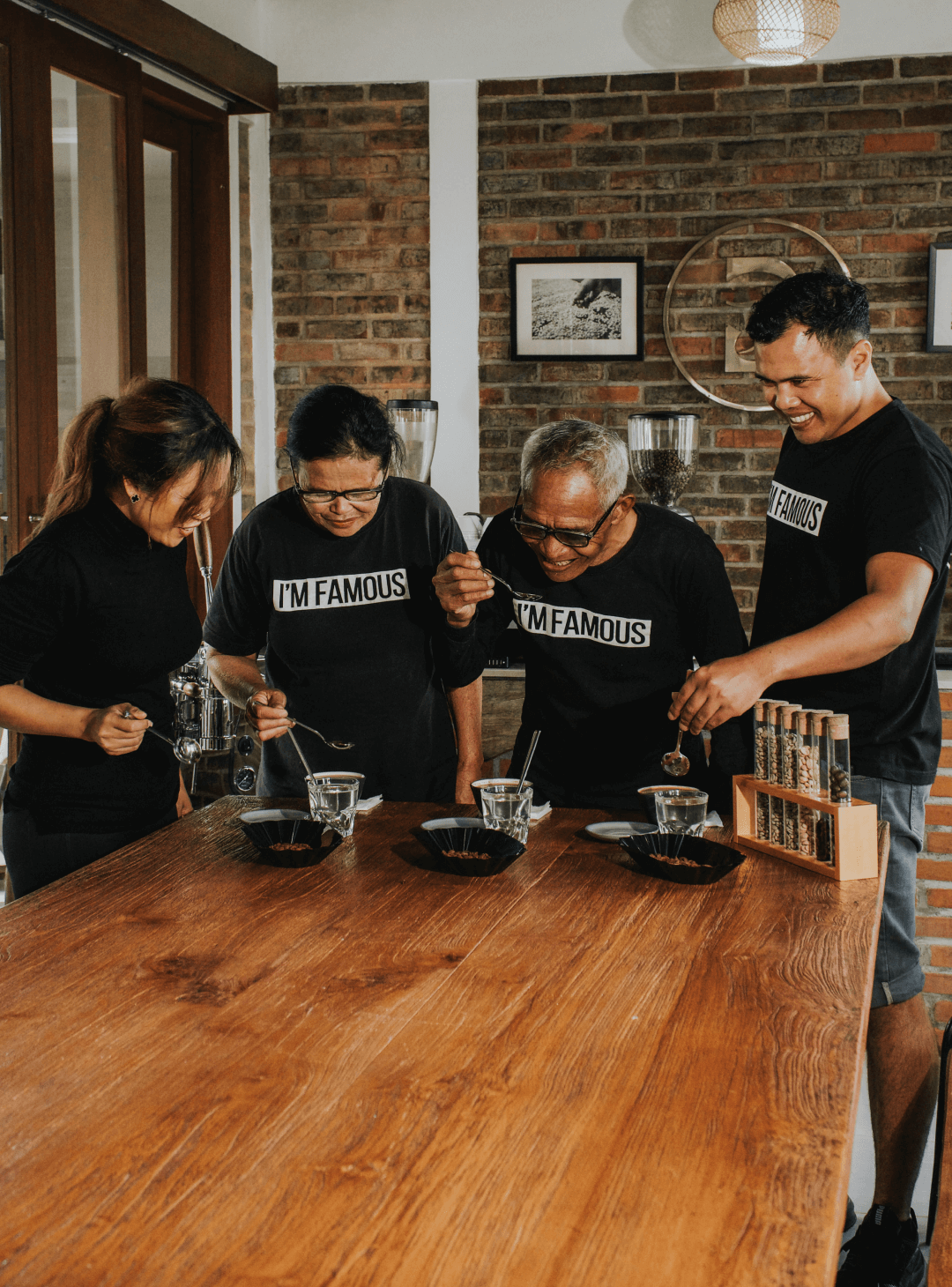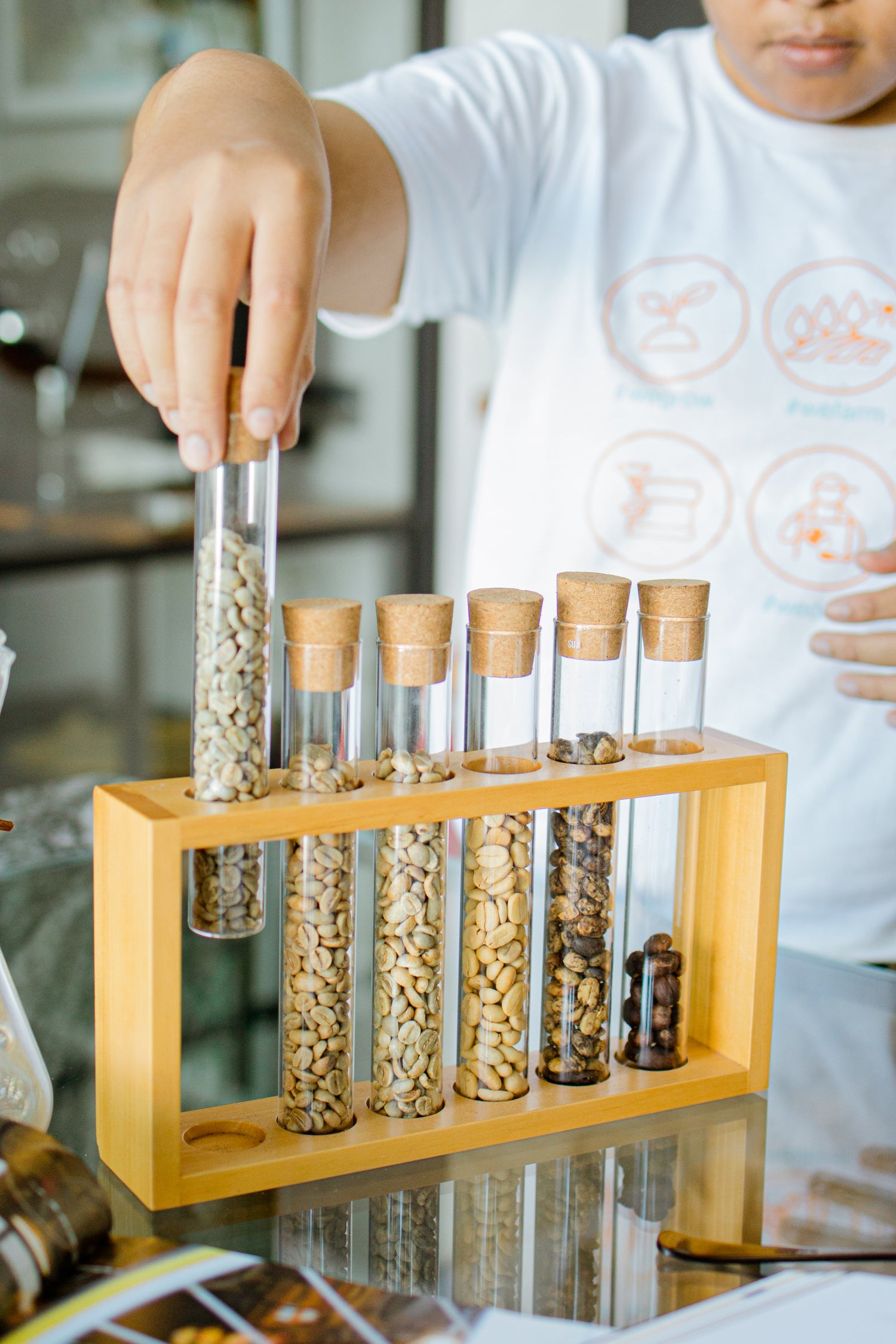We are sure you do not compromise in quality, fine taste and pure goodness, and that's why we know you will love Bali Beans Coffee
-
#WEGROW
Our coffee is sustainably grown in natural, tree-shaded plantations, free from chemicals—preserving both the environment and rich Balinese soil.
-
#WEFARM
With years of expertise and tradition, our family and local farmers cultivate each bean with dedication, ensuring the highest quality in every harvest.
-
#WEPROCESS
By managing our own independent production facility, we maintain full control over processing, guaranteeing premium quality from start to finish.
-
#WEROAST
We roast our beans fresh at the plantation using a W15 Giesen machine, ensuring precision, consistency, and rich flavor in every batch.
-
#WEDELIVER
From farm to cup, we serve you premium, direct-trade coffee with no middlemen—just fresh, high-quality beans delivered straight to you. #DirectTrade
Enjoy premium, freshly roasted coffee straight from our plantation. Whether for home brewing or business supply, our coffee is crafted for quality, consistency, and rich flavor—available in both retail and wholesale.
-
Harga reguler Dari Rp 140.000,00 IDRHarga regulerHarga satuan / per
-
Harga reguler Dari Rp 160.000,00 IDRHarga regulerHarga satuan / per
-
Harga reguler Dari Rp 160.000,00 IDRHarga regulerHarga satuan / per
-
Harga reguler Rp 160.000,00 IDRHarga regulerHarga satuan / per
-
Harga reguler Rp 120.000,00 IDRHarga regulerHarga satuan / per
-
Harga reguler Rp 150.000,00 IDRHarga regulerHarga satuan / per

OUR STORY
The Sudana Family's Heritage
Since 1985, we The Sudana family has been cultivating organic Arabica coffee in the breathtaking Kintamani Highlands of Bali, Indonesia. Nestled at altitudes between 3,200 and 3,900 feet, this region is renowned for producing premium coffee thanks to its rich volcanic soil and ideal weather conditions.
As proud members of the traditional farming cooperative “Subak Abian” we collaborate with local farmers to promote sustainable coffee practices that enhance quality while supporting our community. Our shift towards specialty coffee focuses on environmentally friendly methods, benefiting both the farmers and the ecosystem.
At Bali Beans, we manage every step of the coffee journey, ensuring a commitment to direct trade that provides you with the freshest brews. Enjoy our exceptional coffee by visiting our plantation, our Umalas branch, or one of the many outlets serving our roasted beans.
Let’s drink coffee from farmers.
Sudana Family
THE CRAFT BEHIND EVERY BEAN
Our State of The Art Coffee

There are 3 predominant ways coffee has been traditionally processed: Washed, Natural plus Honey and we handle all these major types of processing in our facility. Essentially, the tasting notes of the coffee can vary significantly depending on the type of processing it undergoes.
Washed
Washed coffees are all about the beans because they depend mostly on how much natural sugar and nutrients they have absorbed during the growing cycle. Washed process highlights the true character of single origin beans like ours, and that’s why so many speciality coffees are processed this way.
Honey
Yep, you’ve guessed it, it’s like someone added a dollop of fresh honey and caramelized chocolate in your morning cuppa, without the calories. Although the name honey-processed actually comes from how sticky the beans can be during processing and not from their sweet rich flavour. The cherry peel of the coffee is removed, but part of the fleshy inside, or the mucilage, is left on the beans when they dry, which means they are often left rounded in sweetness with a complex mouthfeel.
Natural/Dry Process
Natural or dry-process can be considered the most eco-friendly way of processing coffees. Basically, the fruit is left on the beans, and stays that way until the coffee dries. Though dry-process coffees need very little investment, they require specific climatic conditions, so that fruits and seeds dry in time. At Bali Beans, we believe this process brings out some of the most flavourful coffees, with interesting tasting notes and characteristics.
There are 3 predominant ways coffee has been traditionally processed: Washed, Natural plus Honey and we handle all these major types of processing in our facility. Essentially, the tasting notes of the coffee can vary significantly depending on the type of processing it undergoes.
-
Fantastic specialty coffee (espresso and latte) roasted on site. I also got to try the delicious cascara (dried coffee fruit) tea that I've been wanting for a while. They also have a great selection of coffee books and I picked up some local single origin beans which were quite cheap
Barry Williams-Customer -
Check out their @balibeanscoffee Instagram first because it will definitely make you want to come here! The family runs an organic coffee business and prepares all kinds of coffee right in the middle of their plantation. It's like a dream to come here for anyone who loves coffee.
Jakub Kapušňák-Customer -
Very different coffee. When we visited in the afternoon, instead of being given regular coffee, we received a light, fragrant coffee that was more similar to tea and was best suited for the afternoon. There is also a tea made from coffee husks, an initial but pleasant taste.
Rex Sumner-Customer -
A truly amazing activity, heavy with culture and family influence at the forefront. 5 stars all the way! 🙂 xo ❤❤
Nahla Abdul Wahab-Customer
-

Our Favourite Spots in Bali to Get Excellent Co...
Bali is now not only home to some excellent baristas and beans, but the coffee shop scene is alive and thriving! Whether it’s locally produced coffee beans or premium imported...
Our Favourite Spots in Bali to Get Excellent Co...
Bali is now not only home to some excellent baristas and beans, but the coffee shop scene is...
-

UFF20 Presented by ABC Local Heroes Series: Ayu...
Mengusung tema Heroes, Ubud Food Festival 2020 Presented by ABC menyoroti sosok-sosok di balik skena kuliner Indonesia yang berperan penting dalam menyehatkan dunia gastronomi Indonesia. Untuk tahun keenam kami, kami...
UFF20 Presented by ABC Local Heroes Series: Ayu...
Mengusung tema Heroes, Ubud Food Festival 2020 Presented by ABC menyoroti sosok-sosok di balik skena kuliner Indonesia yang...
-

KOPI BALI BEANS DARI KEBUN KE CANGKIR MU
Apapun akan saya lakukan untuk secangkir kopi. Ketika saya melihat peta Bali Utara untuk menemukan lokasinya Bali Beans Roastery, saya melihat Plaga terletak di dekat Bedugul. Tidak terlalu jauh di peta....
KOPI BALI BEANS DARI KEBUN KE CANGKIR MU
Apapun akan saya lakukan untuk secangkir kopi. Ketika saya melihat peta Bali Utara untuk menemukan lokasinya Bali Beans Roastery, ...
-

Apa itu Kopi Perdagangan Langsung?
Ketika Bali Beans memutuskan untuk membuka bisnis mereka tepat di pegunungan, di perbatasan antara Plaga dan Kintamani, rasanya agak kontra-intuitif. Mereka lebih dari satu jam dari pusat minum kopi besar...
Apa itu Kopi Perdagangan Langsung?
Ketika Bali Beans memutuskan untuk membuka bisnis mereka tepat di pegunungan, di perbatasan antara Plaga dan Kintamani, rasanya...
-

Apa itu Shade-Grown Coffee
Jika Anda pernah mengunjungi perkebunan kopi Bali Beans, Anda akan melihat bahwa pohon kopi mereka tumbuh sembarangan di sekitar medan, di antara pohon-pohon yang lebih tinggi yang memberi mereka keteduhan....
Apa itu Shade-Grown Coffee
Jika Anda pernah mengunjungi perkebunan kopi Bali Beans, Anda akan melihat bahwa pohon kopi mereka tumbuh sembarangan di...
Follow us on Instagram
Section heading
Section description

















































